|
|
|
Sort Order |
|
|
|
Items / Page
|
|
|
|
|
|
|
| Srl | Item |
| 1 |
ID:
188526
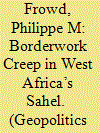

|
|
|
|
|
| Summary/Abstract |
This article argues that border management practices in the Sahel, strongly driven by European concerns and funding, are reaching into new geographic and policy areas. It introduces the concept of borderwork ‘creep’, to highlight how border management practices have, in the last 15 years, expanded along three axes. This term borrows from debates on ‘function creep’ in surveillance studies which have generally been focused on digital technologies in the global north. The first axis is a cartographic one, with borderwork functioning through a denial of cartographic limits to border security. Borderwork has crept inland, with security practices taking an expansive vision of the borderland and bringing controls to key inland nodes. The second is that of a cross-pollination of policy areas with a growing role for judicialised modes of justification for borderwork. The third relates to faith in technology, with new digital geographies making borderwork in the Sahel reliant on data handling and sharing. To make these arguments, the article draws on fieldwork since 2013 in Senegal, Mauritania, and Niger. By examining the breadth and expansion of borderwork in the Sahel, it contests visions that centre ‘Fortress Europe’ and instead highlights the multiple often overlapping global and local interests that expand borderwork in the Sahel.
|
|
|
|
|
|
|
|
|
|
|
|
|
|
|
|
| 2 |
ID:
132336
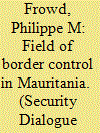

|
|
|
|
|
| Publication |
2014.
|
| Summary/Abstract |
Recent work on borders has tended to overlook border control actors, practices and rationalities in West Africa. States in this region are considered origin and transit countries for irregular migration, and the Sahel region that they straddle is widely seen as an emerging haven of terrorist activity. This article discusses one response to these migration and terrorism threats by the Islamic Republic of Mauritania: a programmme to build new border posts with help from global partners that include the European Union and the International Organization for Migration. The article builds on Bourdieusian approaches in critical security studies, but draws on concepts from actor-network theory to account for the heterogeneity of border control actors and the mobility of different knowledges about how to control borders. Drawing on ethnographic research in Mauritania, the article discusses four 'actants' of border security: the border posts, the landscape, the biometric entry-exit system and training practices. Throughout, the article highlights field dynamics of competition, cooperation and pedagogy, also emphasizing the role of non-human agency. The article concludes with a reflection on the link between border control and statebuilding, suggesting that this fusion is a broader paradigm of security provision in the global South.
|
|
|
|
|
|
|
|
|
|
|
|
|
|
|
|
| 3 |
ID:
157922
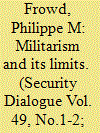

|
|
|
|
|
| Summary/Abstract |
This article assesses the concepts of militarism and militarization in relation to contemporary security interventions in the Sahel, a region increasingly understood through the prisms of violence, cross-border illicit flows, and limited statehood. This region is subject to security interventions that include French military action, EU-funded projects to prevent drug trafficking, and both bilateral and multilateral efforts against irregular migration. To many observers, it is experiencing an ongoing militarization. We argue that while the inextricable concepts of militarism and militarization go some way towards explaining interventions’ occasional use of military violence, they are limited in their grasp of the non-martial and symbolic violence in security practices. We instead propose a focus on assemblages of (in)security to show the heterogeneous mix of global and local actors, and often contradictory rationalities and practices that shape the logics of symbolic and martial violence in the region. Throughout, the article draws on the authors’ fieldwork in Mauritania, Senegal, and Niger, and includes two case studies on efforts against the Sahel’s ‘crime–terror nexus’ and to control irregular migration through the region. The article’s contribution is to better situate debates about militarism and militarization in relation to (in)security and to provide a more granular understanding of the Sahel’s security politics.
|
|
|
|
|
|
|
|
|
|
|
|
|
|
|
|
| 4 |
ID:
184705
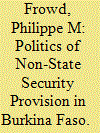

|
|
|
|
|
| Summary/Abstract |
This article examines the rise of the koglweogo self-defence groups in Burkina Faso, developing an empirical analysis of their practices and a conceptual approach to their ambiguous status. The article describes the ‘koglweogos’’ rise since 2014, their growth across urban and rural areas in Burkina Faso, and their involvement in tasks from crime-fighting to counterterrorism. The article builds on the existing literature on vigilantism and security provision in African states and outlines a conceptual framework highlighting the koglweogos’ pursuit of recognition. The koglweogo toggle between overlapping ‘amateur’ and ‘professional’ repertoires of security discourse and practice, pursuing recognition as security professionals but also the autonomy and flexibility of working in the margins. This emphasizes the symbolic value, social and political contestability, discursive construction, and imaginaries of security whilst eschewing a state/non-state binary. The article draws on fieldwork carried out with multiple koglweogo groups to highlight their role as auxiliaries in global security governance, their production of security claims in the absence of recognition, their production of public authority, and their relationship of collaboration with and contestation of the state. The article concludes with reflections on the broader utility of the concept of ‘security amateur’ in Africa and further afield.
|
|
|
|
|
|
|
|
|
|
|
|
|
|
|
|
| 5 |
ID:
173921
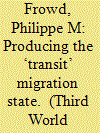

|
|
|
|
|
| Summary/Abstract |
Despite a growing interest in transit migration and border controls along migration routes, there is relatively little work on the production and operation of the category of ‘transit’ itself. This article investigates how Niger emerges as a country of migration ‘transit’ and what impacts this categorisation has had on security and development interventions targeting the country. Building from the literature on the governance of transit migration and on the ‘migration state’, this article theorises transit as a political label. It argues that Niger’s status as a transit country is constructed through a ‘polyvocal’ process involving the discourse and everyday assumptions of international and local actors. The article locates this shared understanding in official texts, everyday routines, and sub-state diplomatic practices. It goes on to argue that these framings, despite divergent rationales, have effects visible in the evolution of security intervention in Niger. These include shifts in the location of border security, the blurring of migration into other transnational threats, and the creation of new domestic institutional practices. The article contributes to theorising the political construction and specificity of transit-ness and provides a fresh case for the research agenda on inter-state relations around migration governance.
|
|
|
|
|
|
|
|
|
|
|
|
|
|
|
|
| 6 |
ID:
157069
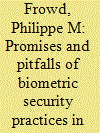

|
|
|
|
|
| Summary/Abstract |
West African states like Senegal are increasingly turning to biometric technologies for border security. In this article I argue that this trend results from the construction and circulation of knowledge about biometrics by a transnational field of security professionals, assembled through official publications as much as through professional practices such as workshops. I argue that this biometric ideal rests on the promise to states in the global south that these technologies enable “smarter” and more efficient borders, enhance prestige, and facilitate states’ integration into global security arrangements. I go on to argue that, although the biometric ideal is often shared by security professionals in the North and South alike, the implementation of biometrics themselves is riddled with failure. These failures are revelatory and stem as much from the technical limitations of biometrics’ border security applications as they do from relations of competition and disaggregation between local security professionals. Drawing on fieldwork in Senegal, I use the country’s entry-exit system and biometric documents to give a view of the everyday practices behind the deployment of security technologies in the country. In doing so, I contribute to research on biometrics in West Africa by adding a focus on these technologies’ security implications.
|
|
|
|
|
|
|
|
|
|
|
|
|
|
|
|
|
|
|
|
|